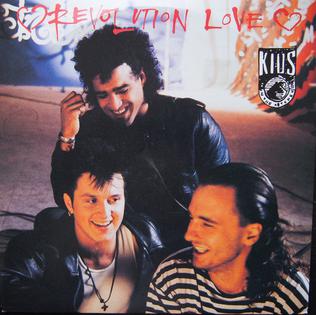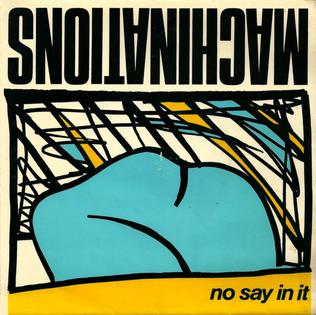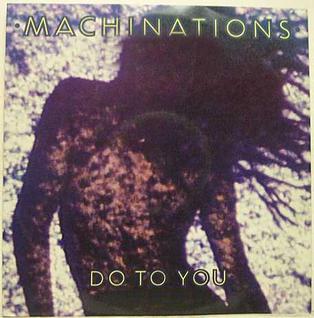
Lady Samantha is a British only compilation album by DJM Records of songs recorded by Elton John. Originally released in cassette and 8-track tape formats in 1974, the album featured rarities and B-sides from the earliest days of John's career. It would eventually be issued on vinyl in 1980 by DJM and finally on CD in 1988.
"When You Walk in the Room" is a song written and recorded by Jackie DeShannon. It was initially released as a single on November 23, 1963, as the B-side to "Till You Say You'll Be Mine". It was re-released as an A-side in September 1964, and later included on the album Breakin' It Up on the Beatles Tour. The single charted on the US Billboard Hot 100, peaking at number 99.
Machinations are an Australian synthpop band which formed in 1980. They reached the top 20 on the Kent Music Report albums chart with Big Music in 1985. Their top 30 hits on the related singles chart are "Pressure Sway", "No Say in It", "My Heart's On Fire" and "Do to You". By 1989 the group had disbanded. They briefly reunited in 1997 and then reformed in 2012.

"Too Much Ain't Enough Love" is a song by Australian rock singer, Jimmy Barnes. It was released in October 1987 as the first single from Barnes' 1987 album, Freight Train Heart It was his first Australian No. 1 hit single, while reaching No. 4 on the New Zealand Singles Chart. In the United States it was issued in the following year, which peaked at No. 91 on the Billboard Hot 100 in July 1988. It featured back-up vocals by Venetta Fields, as well as Wendy Matthews, who later found acclaim as a solo singer.

The discography of British-Irish musician Chris de Burgh consists of 23 studio albums, 9 compilation albums, 4 live albums, and 66 singles, along with 8 videos and DVDs and one box set. His 23 studio albums consist of 19 of completely new material, 2 albums of cover versions, 1 album featuring a mix of new songs, cover versions, and re-recordings and 1 consisting of acoustic versions of previously released tracks. His debut album, Far Beyond These Castle Walls, released in 1974, reached number 1 in Brazil, but failed to chart elsewhere.
"Say I Love You" is a song written by Eddy Grant in 1979. The song was first released on Grant's 1979 album Walking on Sunshine.

"Standing in the Rain" is a disco song recorded by Australian pop singer John Paul Young. It was released in Europe in February 1977 and in Australia in December 1977 as the third and final single from Young's third studio album, J.P.Y. (1976). The song was written by George Young and Harry Vanda.

"Don't Go" is a song by Australian pop group Pseudo Echo. The song was released in October 1985 as the lead single from their second studio album, Love an Adventure (1985). The song became the band's second top five single, reaching number 4 on the Australian Kent Music Report.

"Love an Adventure" is a song by Australian pop group Pseudo Echo. The song was released in January 1986 as the second single from their second studio album, Love an Adventure (1985). The song became the band's third Australian top ten single, peaking at number 6 on the Australian Kent Music Report.

"Living in a Dream" is a song by Australian pop group Pseudo Echo. The song was released in April 1986 as the third single from their second studio album, Love an Adventure (1985). The song peaked at number 15 on the Australian Kent Music Report and number 57 on the American Billboard Hot 100 in 1987.

"Try" is a song by Australian pop group Pseudo Echo. The song was released in September 1986 as the fourth and final single from the Australian release of their second studio album, Love an Adventure (1985). The song peaked at number 60 on the Australian Kent Music Report.

"Sugar Free" is a song from Australian pop group Wa Wa Nee. The song was released in December 1986 as the third single from their self-titled debut studio album. The song peaked at number 10 on the Australian singles chart, and number 35 in the US on the Billboard Hot 100.

"One and One (Ain't I Good Enough)" is a song from Australian pop group Wa Wa Nee. The song was released in April 1987 on 2x7" Vinyl Single as the fourth and final single from their self-titled debut studio album, (1986). The song peaked at number 19 on the Australian Kent Music Report.

"Maybe" is a song by New Zealand singer and songwriter Sharon O'Neill. The song was released in September 1981 as the second single from her third studio album, Maybe (1981). The song became O'Neill's second top twenty single in New Zealand following "Don't Say No to Tomorrow" in 1979.

"Revolution Love" is a song by Australian pop/new wave group Kids in the Kitchen. The song was released in November 1987 as the third and final single from their second studio album, Terrain (1987). The song peaked at number 44 on the Australian Kent Music Report. It was the band's final release before they disbanded.
"(I'm in a) Dancing Mood" is a pop song written and recorded by Delroy Wilson.

"No Say in It" is a song recorded by the Australian synthpop band Machinations. It was released in August 1984 as the lead single from the band's second studio album, Big Music. The song peaked at number 14 on the Australian Kent Music Report, becoming the band's first top 20 single. The song appeared in the film Ruthless People and was included on the soundtrack.

"Do to You" is a song recorded by the Australian synthpop band Machinations. It was released in August 1987 as the lead single from the band's third studio album, Uptown. The song peaked at number 15 on the Australian Kent Music Report, becoming the band's second top 20 single.

"She's the One" is a song by Australian pub rock band the Cockroaches. It was released in January 1987 as the second single from the band's self-titled debut studio album. The song peaked at number seven in the Australian Kent Music Report singles chart.
"Emma" is a song by Australian band Little River Band, released in December 1975 as the second single from the group's self-titled studio album. The song peaked at number 20 on the Australian Kent Music Report singles chart.















